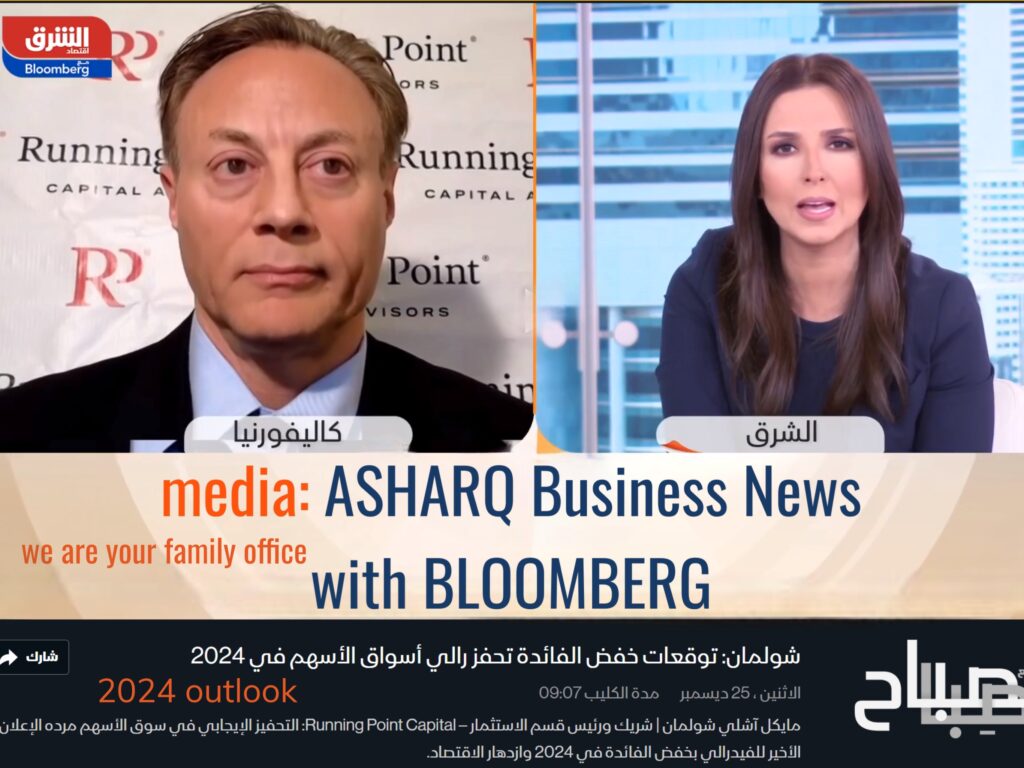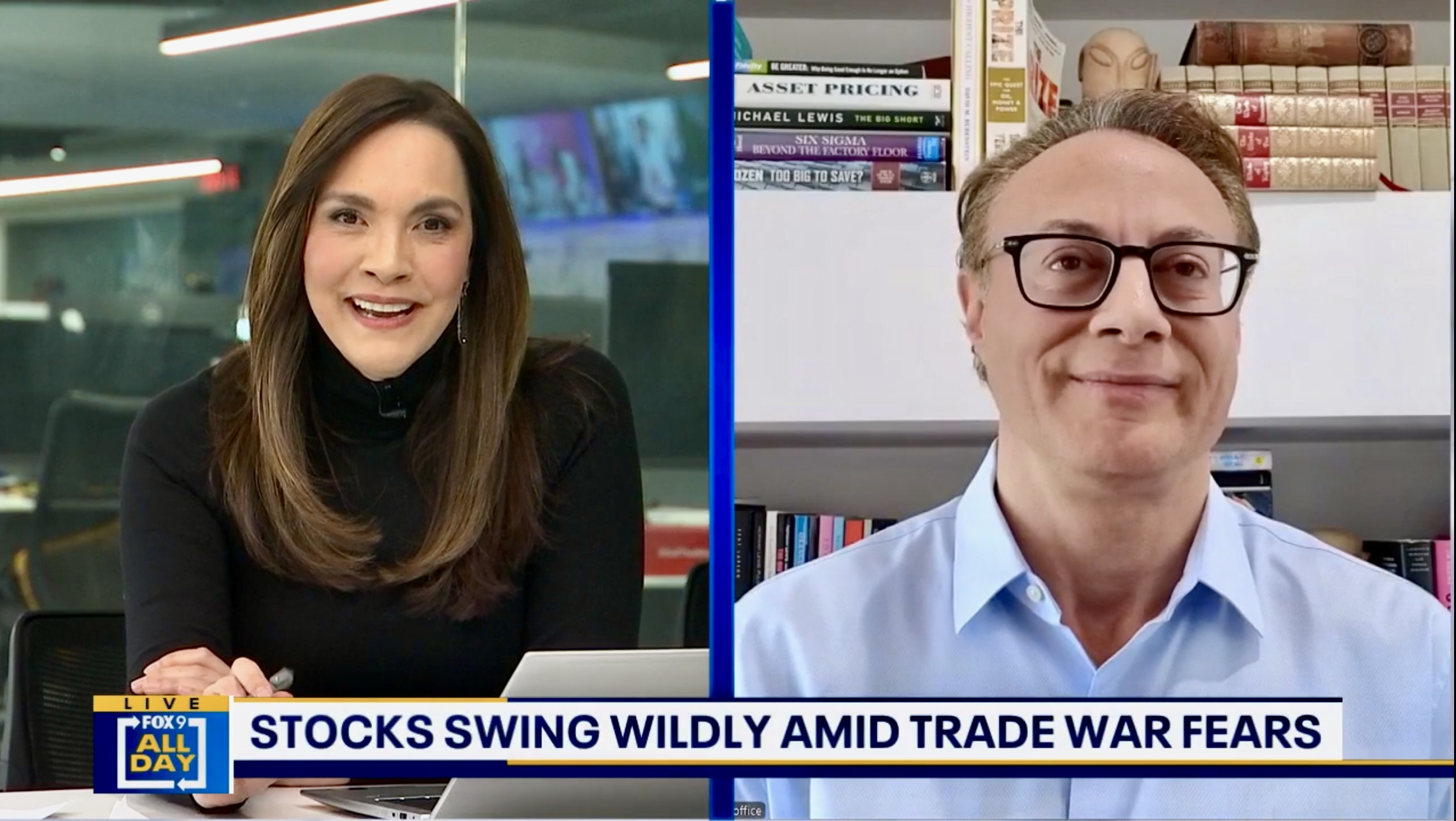Our 2024 Outlook: Inflation, Interest Rates, The Fed, Geopolitics, and Indicators to Watch
Running Point‘s chief investment officer, Michael Ashley Schulman, CFA, was interviewed by Sahar El Mizari of Asharq Business News with Bloomberg — in a Monday morning live TV segment on Cyba Audi’s AlSabah ma’ Cyba (Mornings with Cyba) — regarding our international economic and market outlook for 2024.
We discussed the U.S. economy, Federal Reserve policy on interest rates, stocks, market expectations, inflation, geopolitics, and indicators to watch! The nine minute interview is in Arabic; you can view it here and read my English synopsis below.

The U.S. —
For the U.S., on the positive side, we see strong employment demand, increased productivity from robotics, general technology, and artificial intelligence (AI).
- Labor demand is strong
- Consumers should maintain purchasing power as long as they keep their jobs
- The onshoring boom has boosted capital spending
- Corporate cash flow is at record levels
- Inflation is down from its peaks
- AI and tech are boosting productivity
- Households are wealthy, especially with the housing and stock market run up
- Home prices are supported by multiple factors
- Solid growth and low inflation means that the Roaring 20s theme we wrote about 3 years ago remains intact
Also, there’s a ton of cash and capital on the sidelines looking for a home and seeking to earn more than 5% on T-bills. If short-term rates decline even just a little, it could come flooding back into stocks, private equity, and private lending.
The Fed —
Many market analysts expect the Fed to lower interest rates three times next year; that feels doubtful. The Fed has to ensure that inflation is dormant. Right now, growth is too strong to expect lower rates; we’d need a recession for that.
- Headline inflation is declining with falling energy prices in most G7 countries and because of global supply chains normalizing after Covid
- Core inflation is more sticky in the US and Canada, where easier financial conditions and a rebounding housing market could lift inflation. Core inflation is also more sticky in Japan.
- In Europe and the UK, both headline and core inflation are declining faster to 2%, driven by normalizing supply chains, falling energy prices, and a faster decrease in their economies because of regulation and slower growth in China.
Besides, the Fed truly did not do much to reduce inflation, since inflation was driven by pandemic supply chain bottlenecks which have mostly been relieved once the global economy reopened. As proof, core PCE peaked 22 months ago, i.e., before the Fed began raising rates.
Interest Rates —
Easy money is over, but normal money availability is back, similar to where we were before the great financial crisis. The average person feels that interest rates are high because they are up from the zero to 1% level of the last decade, but realistically, they are probably back to where they should be. Markets tend to look 6-months ahead, but that doesn’t mean they get it right. The common investor assumption in 2023 was that the Fed would have to lower interest rates and that that would help stocks; thus looking ahead, the market rallied in expecation of what it thought woulld occur, even though Fed rates didn’t drop. Stocks may continue to rally in 2024 on a similar assumption.
The one indicator to watch —
For the U.S. economy, everything hinges on unemployment; that is the indicator to watch for 2024. As long as employment remains strong, consumers will spend, and the economy will hold up. It doesn’t matter that pandemic savings are declining, as long as there is cash flow, we are very good at spending💸 But increasing unemployment would be a recessionary indicator.
Some analysts may point out that the unemployment rate is close to triggering the Sahm Rule, which shows that a 1/2% rise in the US unemployment rate on a 3-month moving average from its 12-month low has unerringly signaled recession. The rule currently stands at 0.33%. But this time might be different if unemployment is mostly ticking up because of recent immigrants and naturalized citizens joining the labor force rather than because of firings and layoffs.
Geopolitics —
Contrary to common opinion, geopolitical tensions may ease from here. I mean they can’t get much worse with a proxy-WWIII fought on Ukrainian territory, Middle East battles, US Naval ships shooting down drones, meltdown in Sudan, North Korea testing ballistic missiles, and China gaining interactive naval and air force experience in and around Taiwan.
Looking forward —
We covered a lot and yet still only hinted at the potential opportunities in private debt, healthcare, aerospace & defense and cybersecurity stocks, as well as in energy which may be under-owned and undervalued.
As a multifamily office, we care about strategies for our families’ capital preservation, growth, cash flow maintenance, and tax efficiency in their businesses and their investments. Please reach out to Running Point for your family office, wealth management, and estate planning needs.

We’re in the middle of three continents. Changing Saudi Arabia for the better means helping the region and changing the world. So this is what we are trying to do here. And we hope we get support from everyone.
Mohammed bin Salman Al Saud, Crown Prince and Prime Minister of Saudi Arabia [October 2017]
Disclosure: The opinions expressed are those of Running Point Capital Advisors, LLC (Running Point) and are subject to change without notice. The opinions referenced are as of the date of publication, may be modified due to changes in the market or economic conditions, and may not necessarily come to pass. Forward-looking statements cannot be guaranteed. Running Point is an investment adviser registered with the U.S. Securities and Exchange Commission. Registration does not imply a certain level of skill or training. More information about Running Point’s investment advisory services and fees can be found in its Form ADV Part 2, which is available upon request. RP-23-137


